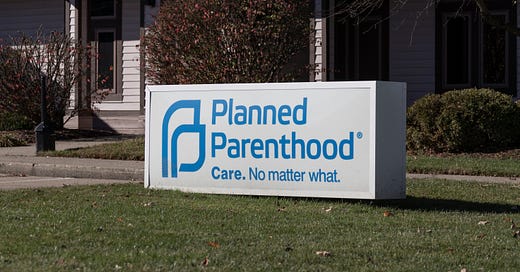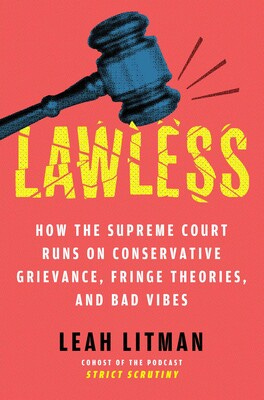The Supreme Court’s Planned Parenthood Decision Isn’t Just Bad for Health Care—It’s Bad Law
Endangering Medicaid and civil rights is all in a day’s work for the Republican-appointed justices
Headlines around Thursday’s Supreme Court decision in Medina v. Planned Parenthood have understandably focused on how bad it is for Planned Parenthood. It is: in a case triggered by South Carolina’s move not to cover Planned Parenthood as a provider under Medicaid, backed by the Court, the decision is likely to embolden states’ efforts to defund Planned Parenthood and other providers entirely, which will deprive Americans everywhere of the vital care they supply.
Unfortunately, to use a phrase none of us wants to hear in a medical context: it’s even worse than you think.
The Court’s decision empowers states to boot any health care providers from the Medicaid program—even in violation of law. It denies patients their legally-protected rights to choose which qualified providers they see, and providers the ability to be “qualified.” And it does so by calling into question whether all laws are… really laws, evincing the Court’s disdain for the law in the process.
Under the federal Medicaid Act, states are required to “provide that” “any individual eligible for medical assistance (including drugs) may obtain such assistance from any institution, agency, community pharmacy, or person, qualified to perform the service or services required.” Congress, when it enacted the measure, called it “free choice by individuals eligible for medical assistance.” The question in Medina v. Planned Parenthood was whether the general civil rights statute, 42 U.S.C. §1983, allows patients and providers to sue states if they believe a state has violated the federal Medicaid Act. Given that Section 1983 allows individuals to sue when they have been “depriv[ed] of rights, privileges, and immunities” that are “secured by… laws” of the United States, it all seems pretty straightforward—the federal Medicaid Act guarantees the right to “free choice,” so surely anyone should be able to sue when a state (say… South Carolina) decides that they just don’t like some providers (say… Planned Parenthood).
Justice Neil Gorsuch’s opinion for the six conservative justices, however, suggested that the federal Medicaid Act isn’t really a federal law. The act is codified in the U.S. Code—the home of federal laws. But Justice Gorsuch explained that it’s really a spending program, created under Congress’s Spending Clause. Spending programs allow the federal government to offer states money upon certain conditions—here, a state’s provision of insurance programs that allow individuals to choose providers, among other things. And, Justice Gorsuch surmised, these programs are not really “commands”—they are “contracts” (that are codified in the U.S. Code). And because “spending-power legislation is ‘in the nature of a contract,’” the Court would be especially stingy in allowing private individuals to sue: “[S]pending power statutes like Medicaid are especially unlikely” “to confer an enforceable right.”
The conservative Justices’ decision to create a special set of rules that govern spending programs is the latest example of one of their mechanisms for getting around whatever laws clash with their political ideologies. The Justices are saying that the regular legal rules don’t apply; instead, a newly made-up category of rules does, which in this case just so happens to make it harder to protect access to the very kind of programs to which the Republican Party has become hostile. (The “Big Beautiful Bill,” for example, would bounce many people off of Medicaid.)
Public benefits programs weren’t the only laws the conservative Justices had in their sights. Their decision is also an attack on the general civil rights statute, 42 U.S.C. §1983, which was passed in the wake of the Civil War. The Supreme Court has a sordid history of blunting the force of Reconstruction-era reforms that sought to protect the rights of Black Americans. In her dissenting opinion, Justice Ketanji Brown Jackson, speaking for all three liberal appointees, said the Court’s decision in Medina belongs in that category. “The Court’s decision today is not the first to so weaken the landmark civil rights protections that Congress enacted during the Reconstruction Era,” she wrote—and pointedly cited past decisions that had invalidated or weakened other civil rights protections. “That means we do have a sense of what comes next: as with those past rulings, today’s decision is likely to result in tangible harm to real people”—including the many Black women who depend on Medicaid for care.
As a result of today’s decision, the only way to enforce the Medicaid Act’s guarantee that patients can choose where they get their health care is for the federal government, here the Trump administration, to threaten a state’s Medicaid funds. Everyone knows the Trump administration isn’t going to lift a finger to help providers like Planned Parenthood and the Medicaid recipients who rely on them.
The decision is going to be especially devastating for people who live in rural areas. Amicus briefs filed in the Planned Parenthood case painted a stark picture of health care availability: Approximately seventy-seven million Americans, or more than 20% of the United States, live in areas identified by the federal Health Resources and Service Administration as having a shortage of health professionals—not enough providers to meet residents’ needs for primary care. 65% percent of rural areas have a shortage of primary care physicians. Ten million women live in counties where there is not a single OB/GYN. Planned Parenthood is one of the providers trying to fill this yawning gap; more than seventy percent of Planned Parenthood’s locations are in rural areas.
When a state excludes Planned Parenthood from Medicaid, that means Medicaid recipients will be denied reimbursement for care they receive there. Patients will be forced to seek another provider—and there may be none to be found.
Medicaid recipients will have to spend more time traveling to find qualified health care, and may have to obtain leave from work or assistance to care for their families. Those additional costs might result in them delaying their care. They might be forced to forego receiving care at all.
The bottom line is that health care in this country, already difficult to access for many—especially for women, especially around reproductive health—is about to get even worse. All because the Supreme Court decided that when it comes to laws they don’t like, they’ll make up some rules about how they’re not really laws at all.
Leah Litman is a professor of law at the University of Michigan and author of LAWLESS: How the Supreme Court Runs on Conservative Grievance, Fringe Theories, and Bad Vibes








Thank you for helping me understand this subject better. Even though I am older and live in a populated area, I grieve that healthcare for women will be lessened and eliminated for others. It saddens me that people don’t care more about others enough to get in the fight.
"They're more like guidelines than actual rules". Barbosa from Pirates of the Caribbean